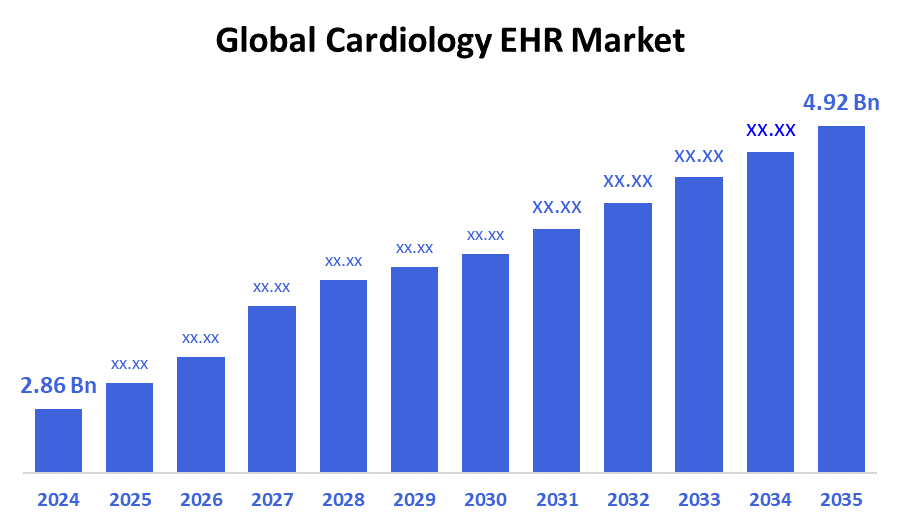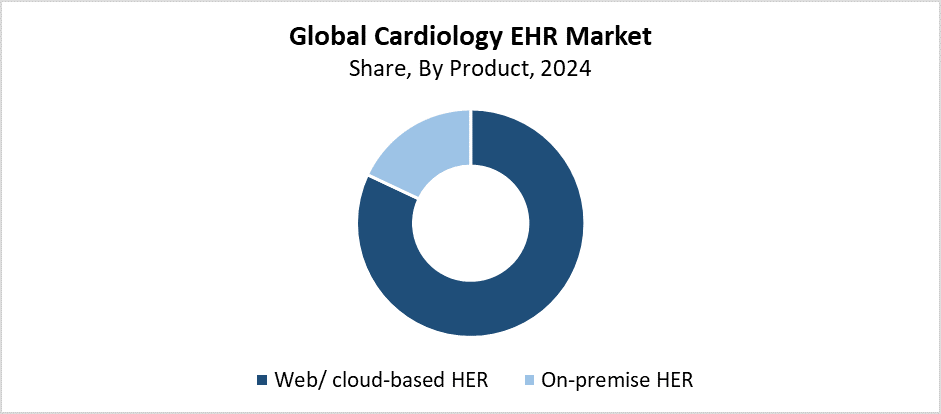Global Cardiology EHR Market
Global Cardiology EHR Market Size, Share, and COVID-19 Impact Analysis, By Product (Web/ Cloud-based EHR, On-premise EHR), By Business Model (Licensed Software, Technology Resale, Subscriptions, Professional Services, Others), and By Region (North America, Europe, Asia-Pacific, Latin America, Middle East, and Africa), Analysis and Forecast 2025-2035
Report Overview
Table of Contents
Cardiology EHR Market Summary
- The Global Cardiology EHR Market Size Was Estimated at USD 2.86 Billion in 2024, and is Projected to Reach USD 4.92 Billion by 2035, Growing at a CAGR of 5.06% from 2025 to 2035.
- The cardiology EHR market is expanding due to several factors, including the prevalence of cardiovascular disease, the need for integrated patient data management, improvements in health IT systems, and government initiatives that support the use of EHRs for better patient outcomes and clinical efficiency.
Key Regional and Segment-Wise Insights

- In 2024, the North American cardiology EHR market held the biggest revenue share of 43.2% and dominated the global market.
- In 2024, the web/cloud-based segment had the largest market share, accounting for 82.16% based on product.
- In 2024, the professional services segment had the largest market share of 31.72% based on business models.
Global Market Forecast and Revenue Outlook
- 2024 Market Size: USD 2.86 Billion
- 2035 Projected Market Size: USD 4.92 Billion
- CAGR (2025-2035): 5.06%
- North America: Largest market in 2024
The cardiology EHR market includes specialized digital systems that handle patient heart-related data for storage and retrieval operations. These tools assist cardiologists in analyzing test results and tracking therapies while they maintain diagnosis records and manage long-term care for their heart disease patients. Cardiovascular diseases (CVDs) remain the world's top killer, which drives the expanding market for electronic health records in cardiology. Healthcare providers are increasingly adopting cardiology-specific EHR solutions because these tools enhance patient results while they optimize workflow efficiency and minimize clinical decision errors. The market expansion is fueled by increasing healthcare facility interoperability, together with the growing demand for unified health information systems.
The market for cardiology EHRs is being greatly influenced by technological developments. Real-time patient data access and clinical capabilities improve through modern technologies such as cloud platforms and mobile-compatible EHR systems along with artificial intelligence analytics. The tools enable cardiologists to deliver precise, individualized medical attention with enhanced operational effectiveness. The worldwide deployment of EHR systems receives momentum from government healthcare digitalization programs that provide funding, establish EHR implementation standards and award incentives. The cardiology EHR market experiences ongoing growth and evolution because of programs aimed at standardizing data formats and enhancing patient engagement and system interoperability.
Product Insights

Why Did the Web/Cloud-Based EHR Segment Lead the Cardiology EHR Market with an 82.16% Share in 2024?
The web/cloud-based EHR segment dominated the cardiology EHR market by securing 82.16% revenue share in 2024. The market leadership of this segment stems from rising requirements for adaptable systems that provide scalable solutions and real-time patient data access from any location at affordable prices. Through their data exchange capabilities, cloud-based solutions improve hospital department communication, thus optimizing cardiac healthcare services. The lack of infrastructure needs makes them highly attractive to small healthcare facilities and independent healthcare providers. The market growth of cloud-based EHR systems received a boost from enhanced data protection features alongside automated software updates and their compatibility with innovative technologies such as telecardiology and remote patient monitoring systems. The expanding use of digital health practices and remote care models drives the market supremacy of cloud-based EHR systems.
The cardiology EHR market's on-premise EHR segment is anticipated to experience significant growth throughout the forecast period. The expansion happens because large hospitals, together with organizations that have mature IT systems, require better control regarding data storage and security, and customization possibilities. On-premise systems are vital for specialist sectors such as cardiology since they enhance data privacy and allow customization of clinical workflows. Several healthcare providers opt for on-premise solutions because they fear data breaches and regulatory compliance issues in cloud environments. The on-premise market will continue its steady growth despite the general industry trend toward cloud solutions, since businesses remain focused on cybersecurity and need specialized secure EHR systems.
Business Models Insights
What Enabled the Professional Services Segment to Capture a 31.72% Revenue Share in the Cardiology EHR Market in 2024?
The professional services segment held the largest revenue share of 31.72% and led the cardiology EHR market revenue in 2024. The professional services segment dominates due to healthcare organizations needing training and support services, along with customization and deployment for optimal EHR system performance in cardiology practices. When healthcare providers adopt advanced EHR platforms, they rely on expert services to ensure smooth implementation alongside data migration and system integration, and regulatory compliance. The services enable businesses to boost their clinical results and operational efficiency through customized EHR feature adaptations to particular cardiology workflows. Expert services become essential for cardiology data complexity and specific configurations, which maintain the dominant position of this market segment.
The subscription segment within the cardiology EHR market will experience significant growth through the forecast period. The rise of cloud-based EHR systems, which offer flexible subscription-based solutions with scalable features and lower initial expenses, drives this growth. Healthcare providers, mainly small to medium-sized cardiology practices, implement subscription models to obtain advanced EHR functionality without needing to invest heavily upfront. The models deliver budget-friendly and straightforward solutions through continuous updates, technical support, and maintenance services. Subscription-based EHR systems gain popularity due to the healthcare industry's rising interest in Software-as-a-Service (SaaS) platforms, which drives strong long-term market expansion.
Regional Insights
The cardiology EHR market in North America dominated globally with the largest revenue share of 43.2% in 2024. The health IT vendors in North America, together with the high electronic health record adoption and advanced healthcare systems, make this region the market leader. The increase in cardiovascular disease cases, together with the need for specialized integrated EHR systems to optimize cardiology operations, drives market expansion. The adoption of EHR systems throughout hospitals and cardiology clinics has been supported by government healthcare programs such as the HITECH Act, along with ongoing CMS payment incentives. EHR solutions in cardiology that integrate AI, cloud computing, and telemedicine technology enhance clinical performance, thus preserving North America's dominance within the global market.
Europe Cardiology EHR Market Trends
The European cardiology EHR market continues to grow steadily due to increasing elderly populations alongside heightened cardiovascular awareness and growing demand for digital healthcare solutions. European healthcare systems have progressively adopted EHRs to improve both patient outcomes and data precision and care coordination in cardiology. Healthcare digitization receives backing from government initiatives that promote EHR system integration, including the EU's eHealth plan. The advancement of interoperability and data-sharing standards enables healthcare providers to establish better collaboration with each other. The market grows because it has an existing healthcare network and strict data privacy regulations, including GDPR, that healthcare providers follow. Europe remains the most critical region for the global cardiology EHR market.
Asia Pacific Cardiology EHR Market Trends
The Asia Pacific cardiology EHR market experiences substantial expansion due to rising cardiovascular disorder cases and increasing digital healthcare adoption, and expanding health IT investment. The healthcare modernization initiatives across China, India, Japan, and South Korea have driven their swift adoption of electronic health records. The region's expanding middle class, together with heightened health awareness and cloud and mobile technology adoption, continue to drive this upward trend. Governments implement national laws together with financial programs to support digital health adoption. The growing demand for enhanced patient care alongside efficient clinical workflows and data-driven decision-making in cardiology practices drives faster adoption of EHR systems. The worldwide cardiology EHR market identifies the Asia Pacific as a rapidly expanding sector.
Key Cardiology EHR Companies:
The following are the leading companies in the cardiology EHR market. These companies collectively hold the largest market share and dictate industry trends.
- Epic Systems Corporation
- athenahealth, Inc.
- Philips Healthcare
- Oracle
- GE HealthCare.
- eClinicalWorks
- McKesson Corporation
- NextGen Healthcare, Inc.
- Veradigm LLC
- Greenway Health, LLC
- Others
Recent Developments
- In September 2024, Oracle revealed major upgrades to its electronic health record (EHR) system with an emphasis on enhancing patient care and professional productivity. Simplified chart reviews, sophisticated documentation capabilities, increased pharmaceutical safety procedures, and improved mobile charting are some of the major enhancements. These developments seek to improve the quality of care while lowering clinician burnout.
- In July 2024, NextGen Healthcare and Advanced Heart Group (AHG), a preeminent cardiology practice in Illinois, collaborated to deploy NextGen Enterprise EHR and PM technologies. The goal of this partnership is to use AI-powered Ambient Assist technology to reduce provider documentation burdens and improve patient involvement through the NextGen PxP Portal. These programs aim to enhance the general patient experience while streamlining procedures.
Market Segment
This study forecasts revenue at global, regional, and country levels from 2020 to 2035. Decision Advisors has segmented the cardiology EHR market based on the below-mentioned segments:
Global Cardiology EHR Market, By Product
- Web/ cloud-based EHR
- On-premise EHR
Global Cardiology EHR Market, By Business Model
- Licensed Software
- Technology Resale
- Subscriptions
- Professional Services
- Others
Global Cardiology EHR Market, By Regional Analysis
- North America
- US
- Canada
- Mexico
- Europe
- Germany
- UK
- France
- Italy
- Spain
- Russia
- Rest of Europe
- Asia Pacific
- China
- Japan
- India
- South Korea
- Australia
- Rest of Asia Pacific
- South America
- Brazil
- Argentina
- Rest of South America
- Middle East & Africa
- UAE
- Saudi Arabia
- Qatar
- South Africa
- Rest of the Middle East & Africa
Check Licence
Choose the plan that fits you best: Single User, Multi-User, or Enterprise solutions tailored for your needs.
We Have You Covered
- 24/7 Analyst Support
- Clients Across the Globe
- Tailored Insights
- Technology Tracking
- Competitive Intelligence
- Custom Research
- Syndicated Market Studies
- Market Overview
- Market Segmentation
- Growth Drivers
- Market Opportunities
- Regulatory Insights
- Innovation & Sustainability
Report Details
| Scope | Global |
| Pages | 240 |
| Delivery | PDF & Excel via Email |
| Language | English |
| Release | Sep 2025 |
| Access | Download from this page |
